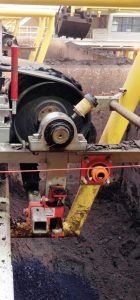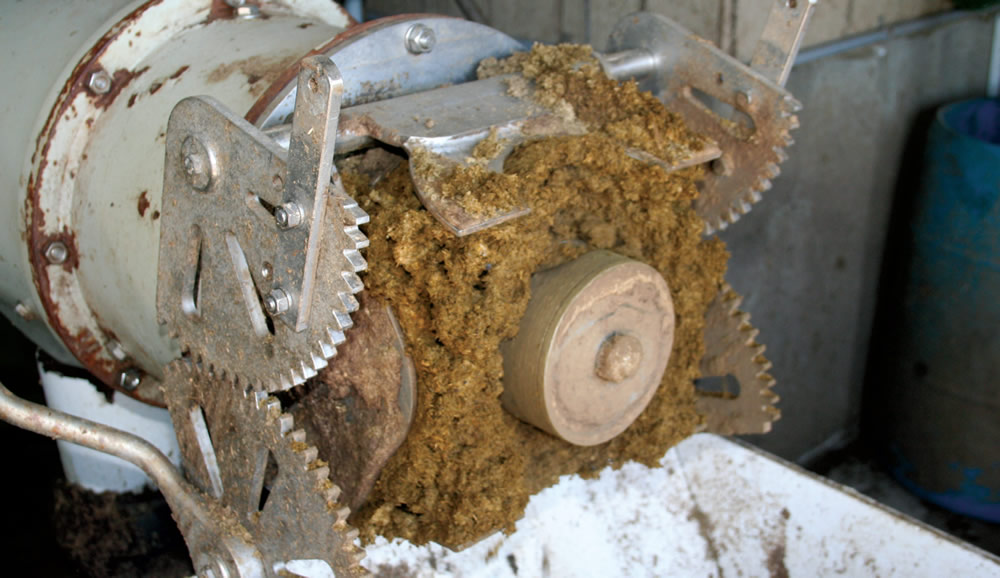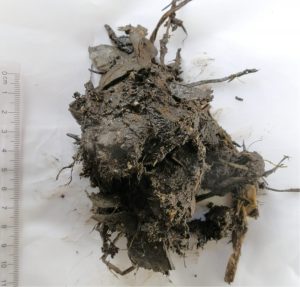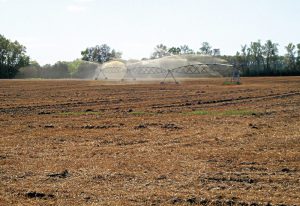Norma McDonald and Amy McCrae Kessler
What is digestate, how do you describe it to regulators or market it to customers? That’s the critical digestate knowledge gap addressed by the American Biogas Council‘s (ABC) Digestate Standard Testing and Certification Program (Program).
Once organic material has been processed in an anaerobic digestion system, the liquid and/or solid products that exit the system are called raw or whole digestate. These products have been physically and chemically changed, acquiring desirable qualities that make it more valuable when beneficially used. The ABC Digestate Standard Testing and Certification Program is a voluntary, industry-led specification that sets forth the testing methods and quality management system for characterizing these products. The Program quantifies the beneficial physical and chemical changes resulting from the digestion process, and delineates the physical and agronomic properties of the digestate products.
Program Origins
Development of the Program began in 2014 when several ABC member companies encountered both market and regulatory barriers to selling digestate. These barriers were created by unfamiliarity with digestate as a product and the absence of standard analytical methods for determining its agronomic value and safety. The ABC recognized that lack of consistent regulation and understanding of the beneficial properties of digestate produced from the processing of non-sewage derived organics (such as household organic waste) prevented digestate from finding its target markets.
Project lenders viewed digestate as a liability rather than the revenue-generating product that project developers know it can and should be. To encourage investment in biogas projects and grow the industry, the ABC recognized that the “digestate knowledge gap” needed to be addressed; thus work on the Program began in earnest.

Dewatered digested solids. Courtesy of American Biogas Council
The Program was formulated with broad stakeholder input by the ABC Co-Products Working Group. The undertaking included three workshops, and more than 50 conference calls and web meetings. The resulting product reflects integration of digestate standards programs in other countries, and relevant portions of existing U.S. Environmental Protection Agency regulations. What ultimately materialized are standardized terminology, testing procedures, and technical data sheets to characterize digestate. This allows digestate’s composition and beneficial use to be accurately represented by biogas project owners and understood and accepted by regulators and customers.
The ABC Co-Products Working Group benefitted tremendously from the participation of so many key stakeholders in this process, note its Co-Chairs, Amy McCrae Kessler and Clarke Pauley: “It was vital to understand the concerns of operators, regulators, farms, consumers and composters receiving digestate to ensure that our Program includes meaningful testing parameters that highlight the agronomic and economic value of digestate and address health and safety concerns.”
Standardized Test Methods
Using prescribed standardized test methods performed by laboratories to be certified under ABC’s Digestate Lab Certification Program, test results and accompanying operational information will quantify the beneficial physical and chemical changes resulting from the digestion process, and delineate the physical and agronomic properties of the digestate products. This information includes: Input materials; Physical characteristic of concern and importance; Chemical characteristics of concern and importance; Agronomic properties; and Potential restrictions on use.
“In order for end users to decide whether or not they want to accept digestate, they need to know what feedstocks were used and enough about the physical characteristics of the digestate to know how these products can be used safely and effectively,” explains Pauley. “Digestate produced from green waste and food waste is widely used in Europe as a drop-in replacement for conventional compost and fertilizers. It is our hope that this ABC digestate standard will provide some additional surety to end users to buy these products with confidence.”
As drafting of the Standard concludes, ABC’s focus shifts to finalizing procedures for lab certification and plans to accept applications in Fall 2016. The Council also will create the Program rules, which will include use of the new logo, required testing frequency and fees. “We are working hard to ensure there is more benefit than cost for the digestate producers,” states Patrick Serfass, ABC Executive Director. “We believe that we created a program that strikes the right balance between providing credible, specific information at the right frequency, and avoiding excessive documentation and reporting requirements that are inappropriate for biogas plants not regulated under the EPA’s Part 503, 40CFR biosolids rule.”
By participating in the Program, biogas plant operators will benefit from having the necessary information to ensuring land application of digestate is in compliance with nutrient management plans. The test results will also help communities and regulators by showing credible reductions in pathogen levels and odor generation.
Program At A Glance
- Covers digestate — whole or separated into liquid and solids — without further chemical modification or thermal treatment that is intended for either direct land application or further processing.
- For digestate derived from feedstocks that include waste activated sludge and other sewage products and are subject to specific regulations per EPA Part 503, the producers must still comply with those regulations, but can also participate in ABC’s Program to bring additional value to their digestate.
- Producers participating in the Program must still comply with all applicable local, state and federal legislation for operation of the facility and digestate handling. No new regulatory limit values are established. This industry led Program is voluntary.
- Serves as a digestate “nutrition label;” does not establish pass/fail values for the digestate, since acceptability is still determined by the customer or end use. Certification demonstrates that the producer follows industry-accepted best practices and that the test results are accurate and representative of the facility’s production.
End Use Classifications
Intended to accommodate a wide variety of digestate produced from a diverse combination of feedstocks and AD systems, the testing protocol is designed to assess the basic physical, chemical and biological characteristics of the digestate. While there are a variety of end uses, the Testing Protocol breaks them down into three broad “End Use Classifications,” each having its own distinct set of laboratory tests reflecting the health and safety concerns most relevant to the use:
- Alternative Daily Cover (ADC) at Landfill or Refuse Derived Fuel (RDF): Digestate from facilities processing postconsumer materials may contain levels of contamination that make it unacceptable for direct land application or as an input to composting. However, the digestate can still find beneficial use by being incorporated into ADC or combined with other high BTU materials and used as RDF.
- Restricted Land Application: Some digestate may warrant restrictions to land application for one or more reasons (e.g., elevated levels of heavy metals, vector attraction or insufficient pathogen reduction). Laboratory tests required for this end use classification are intended to adequately characterize digestate to qualify Program participants to market and sell this product with appropriate land application restrictions, which may include use on only nonfood cropland, or a minimum timeframe between application and crop harvest.
- Generally Unrestricted Bulk Sales or Land Application: Digestate that has undergone equivalent EPA PFRP processes (Process to Further Reduce Pathogens) and has physical and biological characteristics equivalent to EPA Part 503 Class A and “Exceptional Quality (EQ)” standards, qualifies to be marketed and sold in an unrestricted manner, but fully consistent with applicable regulations. Examples include direct land application, consistent input for composting operation, or feedstock for fertilizer production.
The tests that comprise the Testing Protocol were selected by the ABC’s Co-Products Working Group’s Lab Group to demonstrate the characteristics of digestate pertinent to establishing agronomic value. Tests include: Feedstocks; Moisture Content; Pathogens; Macronutrients (N-P-K); Micronutrients; pH; Soluble salts; Total solids; Volatile solids; Organic matter content; Physical particle size; Metals; Visible contamination; Stability (VFA or CO2 respiration); and Maturity indicator/Bioassay (cucumber). While the lab results in the Digestate Information Sheet set forth the measureable values of these characteristics, the standard also explains why these characteristics are important for digestate end-users.
Program Mechanics
The Digestate Standard Testing and Certification Program prescribes standardized test methods, performed by laboratories certified under ABC’s Digestate Lab Certification Program, as well as provides a descriptive, quality hierarchy based on the feedstocks and analytical results for the digestate products. The Program establishes testing and operational documentation requirements for initial certification that are reduced for facilities demonstrating consistent results over a period of time. Participants will be provided with instructions and training on proper sample collection to ensure that test results are representative of production over a given period of time, and adjusted based on size and complexity of the facility.
Once certified, documentation specific to the digestate produced is provided, which can be used for both marketing materials to establish customer assurance for purchase of a producer’s digestate, as well as regulatory submissions. Certified producers can use the ABC logo on these documents.
Basic guidance for effective AD process management is provided, which along with feedstock composition, is key to producing consistent digestate acceptable to the market. Participants will have to demonstrate that appropriate quality management systems are in place, tailored to the specifics of the facility. An AD plant on a dairy farm that only processes manure and has a very consistent daily flow is quite different from a merchant plant accepting organic feedstocks from a broad array of generators, where composition and quantity can swing dramatically.
Broad industry usage of the Program will increase the ABC’s ability to effectively communicate the valuable environmental contributions of the biogas industry. As such, the Digestate Certification Program will benefit project developers; digester owners/operators; regulators; recipients of digestate for either direct use or further processing; testing laboratories; certification bodies; communities and neighbors and the ABC. It can also serve as a model for any future local, state or federal regulation of digestate not otherwise addressed in statute or voluntary compliance programs.
Ultimately, the benefits of the ABC Digestate Standard Testing and Certification Program will be determined by the number of participants. Broader industry participation will bring awareness, increase acceptance by the market and regulators, and encourage adoption by more biogas plant operators. Most importantly, widespread implementation of the Program will ensure that the benefits of AD are well-recognized and that digestate becomes a valued commodity.
Norma McDonald is North American Sales Manager for OWS, a global provider of AD systems and ISO-certified laboratory services relating to AD, composting and bioplastics. She is an ABC Board Member, Co-Chair of the ABC RNG Working Group, and member of ASTM’s committee on degradable plastics. Amy McCrae Kessler is EVP, Head of Environmental & Regulatory Affairs and a Founding Member of Turning Earth, LLC, where she leads local, state and federal permitting initiatives and works across multiple disciplines of project development. She is an ABC Board Member, Co-Chair of ABC’s Federal Legislative and Regulatory Affairs Committee and Co-Chair of the ABC Co-Products Working Group.












